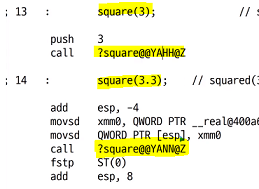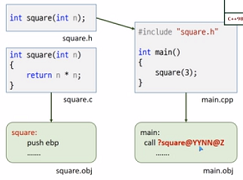codenuri 강석민 강사 강의 내용기반으로 정리한 내용입니다.
name manling
- 컴파일러가 컴파일 시간에 심볼의 이름을 변경하는 현상
- 함수 오버로딩, namespace, template 등의 문법
#include <iostream>
using namespace std;
int square(int n)
{
return n * n;
}
double square(double d)
{
return d * d;
}
int main()
{
square(3);
square(3.3);
}
어셈블리 소스로 정확히 파악 가능
- g++ file.cpp -S
- cl file.cpp /FAs
이런 name mangling 으로 인해 C하고 C++하고 호환성 문제 발생 -> extern
extern “C”
square.h
int square(int);
square.c
int square(int n)
{
return n * n;
}
main.cpp
#include "square.h"
int main()
{
square(3);
}
컴파일러는 확장자를 보고 각 문법을 파싱하는데 square.c는 c문법 기준으로 square가 manling 안된 문법으로 만듬
main.cpp는 C++문법 기준으로 manling 된 문법으로 만드므로 main.obj에서 함수를 찾을 수 없는 error 발생
square.h에 extern “C” 삽입
square.h
extern "C" // C++ 컴파일러에게 C 처럼 해석해 달라.
int square(int);
앞의 예제에서 main.cpp를 main.c로 바꾸면 문제 발생
main.c
#include "square.h"
int main()
{
square(3);
}
main이 .c니까 square.h를 포함하여 컴파일하는데 c 컴파일러는 extern “C” 문법이 뭔지 알 수 없음
최종 코드(__cpluscplus 사용)
square.h
#ifdef __cpluscplus
extern "C" {
#endif
int square(int);
#ifdef __cpluscplus
}
#endif
square.c
int square(int n)
{
return n * n;
}
main.cpp, main.c 둘 다 컴파일 가능해짐
#include "square.h"
int main()
{
square(3);
}
함수이름과 함수 주소
#include <cstdio>
int square(int n)
{
return n * n;
}
double square(double d)
{
return d * d;
}
int main()
{
// printf("%p\n", &square); // error
printf("%p\n", static_cast<int(*)(int)>(&square)); // ok.
// auto p = □ // error
int(*f)(int) = □ // ok.
}
오버로딩된 함수가 있을 경우 주소연산자만을 통해 구할 수 없고 정확히 함수 포인터를 이용해야함
함수와 함수주소
#include <iostream>
#inlcude <typeinfo>
using namespace std;
void foo(int a)
{
}
int main()
{
void(*f1)(int) = &foo; // ok. 함수 주소 꺼내기
void(*f2)(int) = foo; // 함수 이름은 함수 주소로 암시적 형변환
typedef void(*PF)(int); // 함수포인터타입
typedef void F(int); // 함수 타입..
cout << typeid(&foo).name() << endl; // void(*)(int)
cout << typeid(foo).name() << endl; // void(int)
}
| g++에서 a.exe | c++filt -t 로 하면 타입 정확히 볼 수 있음 |
함수 찾는 순서
exactly matching - floo(float)
struct FLOAT
{
FLOAT(float) {} // 변환 생성자, float=>FLOAT로 변환 허용
};
template<typename T>
void foo(T) { cout << "T" << endl; }
void foo(int) { cout << "int" << endl; }
void foo(double) { cout << "double" << endl; }
void foo(float) { cout << "float" << endl; }
void foo(FLOAT) { cout << "FLOAT" << endl; }
void foo(...) { cout << "..." << endl; }
int main()
{
float f = 3.4f;
foo(f);
}
float 가 불림
template = foo(T)
struct FLOAT
{
FLOAT(float) {} // 변환 생성자, float=>FLOAT로 변환 허용
};
template<typename T>
void foo(T) { cout << "T" << endl; }
void foo(int) { cout << "int" << endl; }
void foo(double) { cout << "double" << endl; }
// void foo(float) { cout << "float" << endl; }
void foo(FLOAT) { cout << "FLOAT" << endl; }
void foo(...) { cout << "..." << endl; }
int main()
{
float f = 3.4f;
foo(f);
}
template 가 불림
promotion - foo(double)
struct FLOAT
{
FLOAT(float) {} // 변환 생성자, float=>FLOAT로 변환 허용
};
template<typename T>
// void foo(T) { cout << "T" << endl; }
void foo(int) { cout << "int" << endl; }
void foo(double) { cout << "double" << endl; }
// void foo(float) { cout << "float" << endl; }
void foo(FLOAT) { cout << "FLOAT" << endl; }
void foo(...) { cout << "..." << endl; }
int main()
{
float f = 3.4f;
foo(f);
}
데이터의 손실이 없는 방향으로 변환됨
standard conversion - foo(int)
struct FLOAT
{
FLOAT(float) {} // 변환 생성자, float=>FLOAT로 변환 허용
};
template<typename T>
// void foo(T) { cout << "T" << endl; }
void foo(int) { cout << "int" << endl; }
// void foo(double) { cout << "double" << endl; }
// void foo(float) { cout << "float" << endl; }
void foo(FLOAT) { cout << "FLOAT" << endl; }
void foo(...) { cout << "..." << endl; }
int main()
{
float f = 3.4f;
foo(f);
}
데이터의 손실이 되더로도 표준 타입끼리는 암시적 형변환이 된다.
user define conversion - foo(FLOAT)
struct FLOAT
{
FLOAT(float) {} // 변환 생성자, float=>FLOAT로 변환 허용
};
template<typename T>
// void foo(T) { cout << "T" << endl; }
// void foo(int) { cout << "int" << endl; }
// void foo(double) { cout << "double" << endl; }
// void foo(float) { cout << "float" << endl; }
void foo(FLOAT) { cout << "FLOAT" << endl; }
void foo(...) { cout << "..." << endl; }
int main()
{
float f = 3.4f;
foo(f);
}
변환연산자나 변환 생성자 사용
variadic argument - foo(…)
struct FLOAT
{
FLOAT(float) {} // 변환 생성자, float=>FLOAT로 변환 허용
};
template<typename T>
// void foo(T) { cout << "T" << endl; }
// void foo(int) { cout << "int" << endl; }
// void foo(double) { cout << "double" << endl; }
// void foo(float) { cout << "float" << endl; }
// void foo(FLOAT) { cout << "FLOAT" << endl; }
void foo(...) { cout << "..." << endl; }
int main()
{
float f = 3.4f;
foo(f);
}
변환을 통해 갈 수 있는 곳이 없을 때 마지막으로 가변인자 사용


